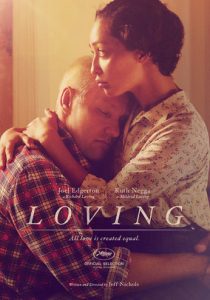Loving-2016
Director Jeff Nichols
Starring Joel Edgerton, Ruth Negga
Scott’s Review #527
Reviewed November 26, 2016
Grade: A
Loving (2016) is a quiet film.
Subdued and poignant, it is an important historical story to tell and jarring to be transported back to the 1950s Southern style, where interracial marriage was not only illegal, but children of interracial couples were barely considered human beings.
This is to say nothing of the views of their parents, specifically of law enforcement.
Sadly, circa 2016, we all should be aware that racism is still alive and well in the United States, and this film is a reminder of how much further we need to go.
The true story of the landmark 1967 Loving vs. Virginia Supreme Court case is the basis for this film.
The time is 1958 in Virginia, and a sweet, working-class couple, Richard and Mildred, are very much in love. Richard-white and Mildred-black are met with some sideways glances around town but generally have a strong, supportive family and friend structure, although both families are pretty poor.
They enjoy spending time with friends in bars and racing cars.
When Mildred becomes pregnant, Richard purchases a plot of land for them and asks Mildred to marry him. Despite the challenges this will create, they are wed in Washington, D.C. Once they return to Virginia, they are arrested for violating anti-miscegenation laws prohibiting interracial marriage.
The couple eventually sued the state of Virginia, leading to a unanimous Supreme Court ruling a decade later.
As a film, Loving is thoughtful and introspective.
The audience questions who we are to decide who someone loves. This can apply to same-sex couples as easily as interracial couples.
The film, led by director Jeff Nichols, creates many quiet scenes of thoughtfulness on the faces of leads Edgerton and Negga.
Furthermore, several scenes of peril encompass the film.
The Lovings constantly threaten to be discovered as they secretly return to their forbidden home state to give birth to their son, only wanting Richard’s mother to perform the birth. The tense scene where Mildred is dropped off on a deserted back road is well shot; the camera constantly focuses on the road and the threat of a car coming by at any moment.
Edgerton, a fantastic actor and director, performs tremendously as a quiet, stoic, blue-collar man who is madly in love with his wife and sees nothing wrong with it simply because it is not the norm.
He is poorly educated, but Edgerton gives him underlying intelligence and a basic understanding of cherished love and more than once calmly utters, “But I love my wife.”
To him, it is that simple. Richard will also use any necessary measures to protect his family, as any man would. Edgerton’s squinting blue eyes portray suspicion, warmth, and love.
Negga is equally compelling as calm and loyal Mildred.
One might expect Mildred to finally explode with rage as she faces obstacle after obstacle, raising three kids in an environment she does not want, yet she never does.
Negga embodies the character with sweetness, wide-eyed passion, and longing for a better life. Mildred tries not to get her hopes up with each impending court date, but Negga successfully portrays the character with many different emotions and complexities.
My favorite scenes of hers involve Mildred gazing at her husband, her eyes filled with love and pride.
Nichols wisely does not spend much time in the courtroom, a positive aspect of the film. Sure, we get the occasional scene of Richard and Mildred facing the court, but the film does not take a different approach than necessary.
Despite a landmark decision coming from Loving’s marriage, the film is a love story between a good man and a good woman who happens to be of different races.
What a lesson every viewer can learn from Loving (2016).
Oscar Nominations: Best Actress-Ruth Negga
Independent Spirit Award Nominations: Best Director-Jeff Nichols, Best Female Lead-Ruth Negga
